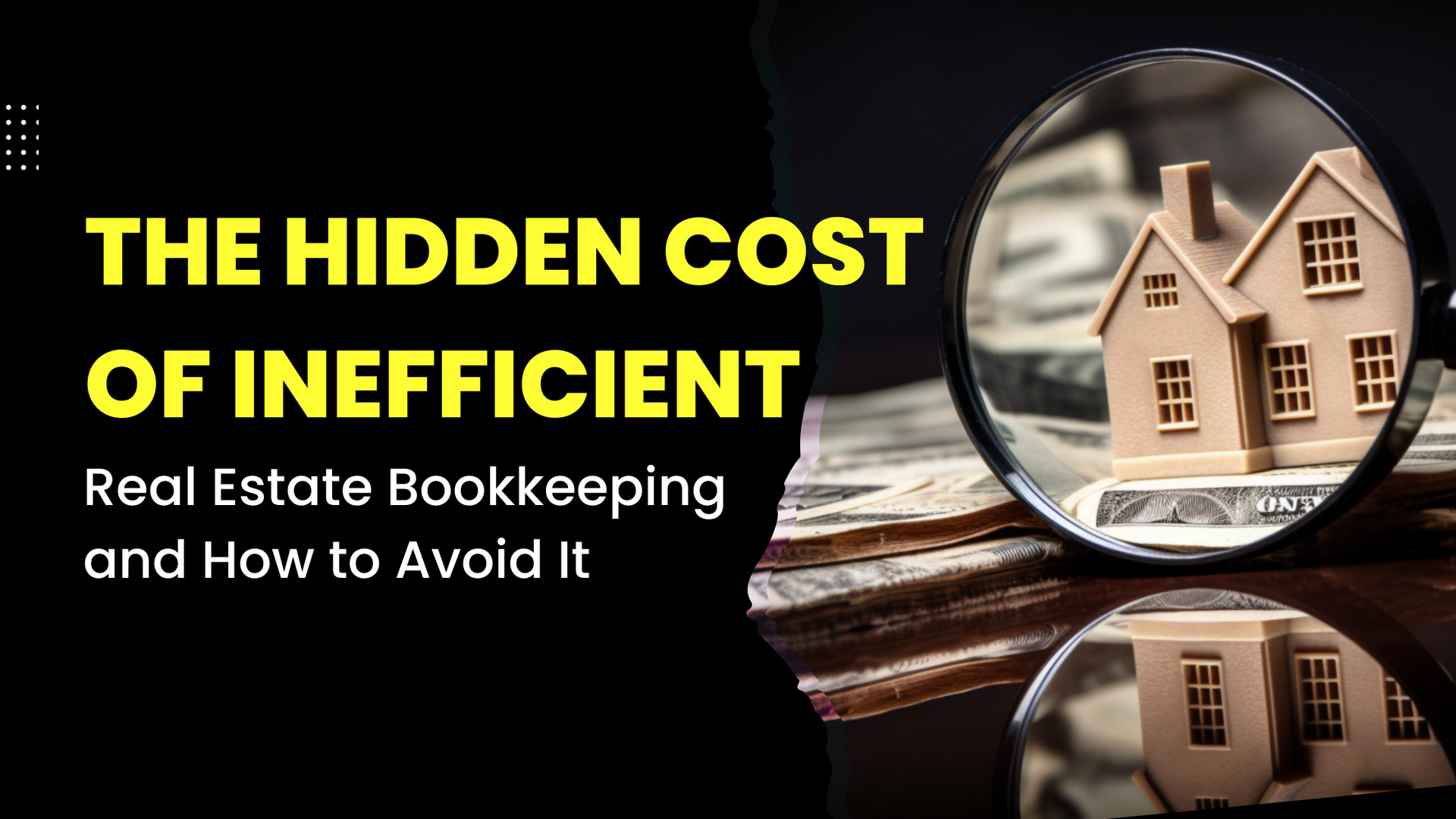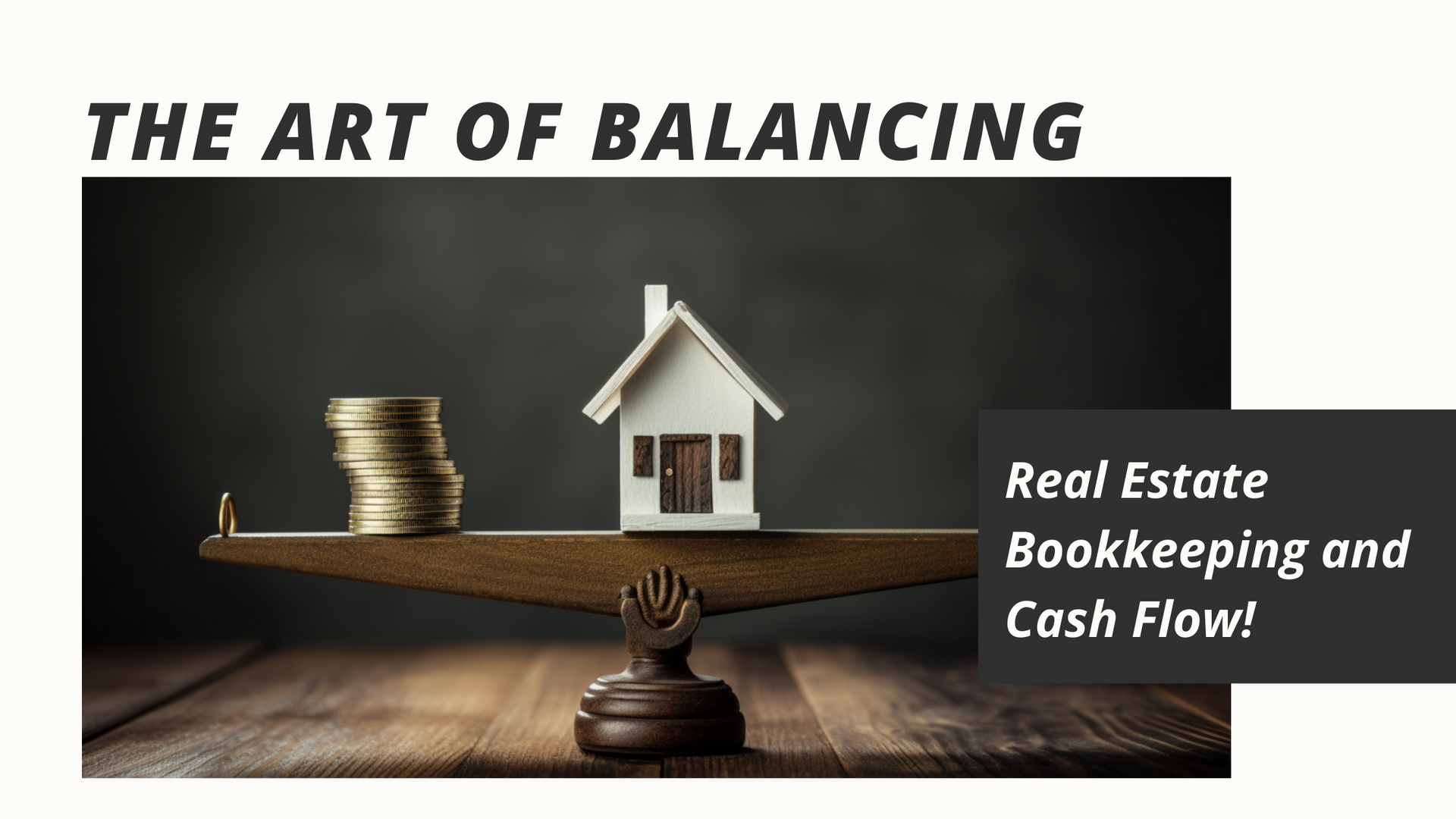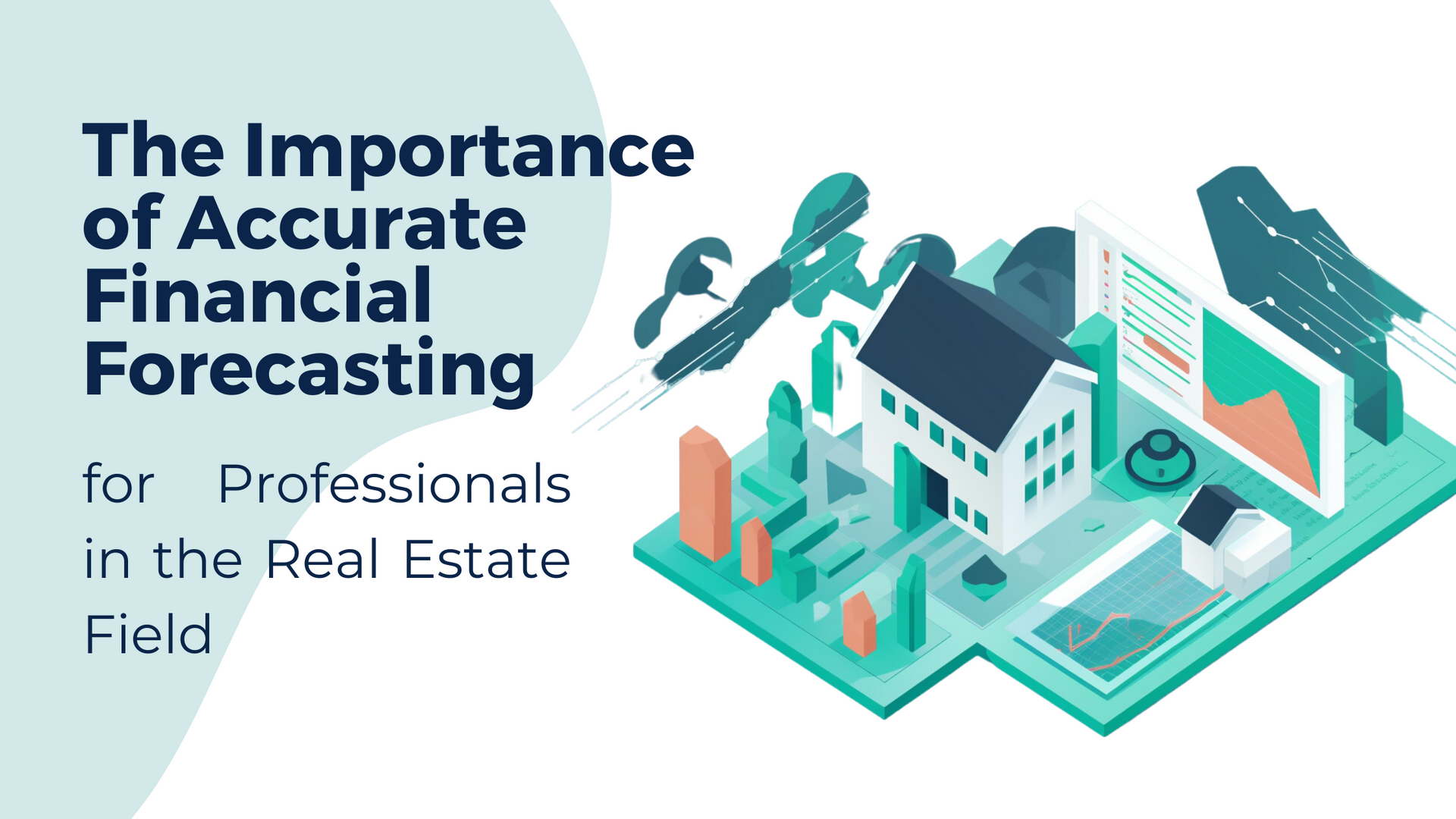The Hidden Cost of Inefficient Real Estate Bookkeeping and How to Avoid It
The Hidden Cost of Inefficient Real Estate Bookkeeping and How to Avoid It

Introduction
In the real estate business, nothing can replace the significance of systematic bookkeeping. From tracking income and expenses to managing tax obligations, bookkeeping serves as the backbone of financial health. However, when inefficiency seeps into this vital process, it can lead to hidden costs that silently drain your business's resources. By exploring The Hidden Cost of Inefficient Real Estate Bookkeeping and How to Avoid It, we aim to shed light on these overlooked pitfalls and provide strategic solutions to fortify your financial standing.
The Hidden Cost of Inefficient Real Estate Bookkeeping and How to Avoid It
Before diving into the hidden costs, let's first understand why efficient bookkeeping is crucial. Bookkeeping in real estate serves to track revenue from property sales or rentals, monitor expenses such as repairs or taxes, and manage assets and liabilities. When inefficiency invades this process, it's not just about misplaced receipts or late reports. It can result in severe financial consequences, missed opportunities, and stunted business growth.
Inefficient bookkeeping can lead to financial errors, such as duplicated entries or missed transactions. These mistakes may seem minor at first glance, but they can significantly impact your financial standing in the long run. Misreported income or expenses can lead to inaccurate financial statements, impacting business decisions based on these erroneous figures. Worse, it can lead to severe tax implications, with possible penalties for underreported income or overclaimed deductions.
Not only does inefficient bookkeeping affect your business financially, but it also carries opportunity costs. When time and resources are wasted on correcting errors or searching for missing information, they can't be used for revenue-generating activities. This inefficiency can curb your business growth, limit your investment potential, and even tarnish your reputation.
Lastly, inefficient bookkeeping can be a major time sink. In real estate, time truly is money, and every minute spent wrestling with complex bookkeeping tasks is a minute not spent on expanding your portfolio. So, it's not just the out-of-pocket costs you need to consider. The value of time lost can also be a significant hidden cost.
As a real estate professional, understanding these hidden costs can be a step towards improving your bookkeeping efficiency, dodging these pitfalls, and fostering robust business health.
Part I: Understanding Real Estate Bookkeeping
Defining Real Estate Bookkeeping
Real estate bookkeeping is more than just noting down transactions in a ledger. It's about managing financial data in a way that supports informed decision-making and sustainable business growth. It involves recording, classifying, and analyzing all financial transactions related to your real estate business. Understanding this foundation will help you spot inefficiencies and avoid the associated hidden costs.
Why Real Estate Bookkeeping Matters
Why bother about real estate bookkeeping? Because it provides critical insights into your financial health, identifies growth opportunities, and ensures regulatory compliance. Good bookkeeping paints a clear picture of your income sources, expense patterns, cash flow status, and overall business performance. It's the radar that detects financial storms ahead, allowing you to navigate safely.
Key Components of Real Estate Bookkeeping
The fundamental elements of real estate bookkeeping include accounts payable, accounts receivable, payroll, and property management. Each plays a crucial role in maintaining a balanced and transparent record of your financial transactions. Learning about these components will help you better understand where inefficiencies may occur and how they can be rectified.
The Role of Technology in Real Estate Bookkeeping
Technology has revolutionized real estate bookkeeping. With software applications, cloud-based systems, and automation tools, managing financial transactions has never been easier. But are you utilizing these technological advancements to their full potential? Understanding the role of technology in bookkeeping is key to improving efficiency and avoiding unnecessary costs.
Part II: The Hidden Costs of Inefficiency
Financial Consequences of Mistakes
Inefficient bookkeeping can lead to costly financial errors. These mistakes often stay hidden until it's too late, silently gnawing at your bottom line. Imagine a small error in logging a transaction; it can balloon into a massive financial discrepancy over time. Here's where Olive Branch Bookkeeping, Inc. can save the day, meticulously managing your records to prevent such inaccuracies.
It's not just about the immediate financial loss; it's the domino effect these mistakes can have on your financial statements and business decisions.
Opportunity Costs: What You Miss Due to Inefficiency
In business, time equals money. Every minute spent on untangling convoluted bookkeeping tasks is a minute not spent on profitable activities. Inefficient bookkeeping robs you of the time you could use to negotiate a better property deal, connect with potential clients, or research new market trends. This opportunity cost, although often overlooked, can be a significant drain on your resources.
Tax Implications of Poor Bookkeeping
Inefficient bookkeeping can lead to inaccurate tax filings, resulting in overpayments, penalties, or even audits. Tax mistakes due to poor bookkeeping practices remain hidden until tax season rolls around. But when they do surface, they can hit hard, impacting your financial stability and business reputation.
Reduced Business Growth Due to Poor Cash Flow Management
Poor bookkeeping often results in inadequate cash flow management. Without a clear understanding of your financial inflow and outflow, you may face unexpected cash shortages, affecting your ability to invest in new properties or cover operating expenses. This can stall your business growth and limit your competitive edge in the real estate market.
Time is Money: The Cost of Inefficiency in Man Hours
Ever tried to trace a missing transaction from months ago or correct a duplicated entry in your records? If you have, you know that such tasks can be huge time sinks. Inefficient bookkeeping can tie you down with such unnecessary tasks, taking away from time that could be better spent on strategic planning or business development.
Part III: Identifying Signs of Inefficient Bookkeeping
Common Symptoms of Poor Bookkeeping
Inefficient bookkeeping often comes with warning signs. Late or incorrect financial reports, frequent cash flow issues, and difficulty tracking transactions are a few telltale signs that your bookkeeping process needs an overhaul. By identifying these symptoms early, you can take proactive measures to enhance efficiency and avoid hidden costs.
Audit Red Flags Due to Inefficient Bookkeeping
Unusually high deductions, frequent amendments to financial statements, and irregularities in income and expense patterns can raise red flags for tax authorities. Such audit triggers often stem from inefficient bookkeeping. Being aware of these red flags can help you rectify errors and improve your bookkeeping practices before they lead to an audit, saving you from potential fines and penalties.
Interpreting the Health of your Bookkeeping through Key Financial Ratios
Key financial ratios like the liquidity ratio, debt to equity ratio, and return on investment can reveal a lot about the health of your bookkeeping process. These ratios, derived from your financial statements, can indicate whether your financial data is accurate and reliable. If the ratios seem off, it might be time to inspect your bookkeeping process for inefficiencies.
The Impact on Business Relationships and Reputation
Poor bookkeeping can affect more than just your financial health. It can lead to late payments, inaccurate billing, and unfulfilled financial commitments, straining your relationships with vendors, lenders, and clients. By identifying and addressing the inefficiencies in your bookkeeping process, you can maintain healthy business relationships and uphold your reputation in the real estate industry.
Part IV: Strategies to Improve Real Estate Bookkeeping
Leveraging Technology for Efficient Bookkeeping
In the digital era, technological tools can help streamline your bookkeeping process. Automation software can handle routine tasks, cloud-based systems can improve data accessibility, and analytics tools can provide insightful financial reports. Leveraging these technologies can significantly enhance your bookkeeping efficiency, freeing up time and resources for your core business activities.
The Role of Professional Bookkeepers
Professional bookkeepers bring expertise and experience to the table. They can ensure accurate and timely recording of transactions, compliance with tax regulations, and efficient management of financial records. Investing in a professional bookkeeper can improve your bookkeeping efficiency, prevent costly errors, and allow you to focus on growing your real estate business.
Efficient bookkeeping is more than just a means to accurate financial records; it's a pathway to sustainable business growth. By improving bookkeeping efficiency, you enhance decision-making, foster financial stability, and unlock growth opportunities. Olive Branch Bookkeeping, Inc. can help you turn this vision into reality, providing comprehensive bookkeeping services tailored to your real estate business's unique needs.
Implementing Regular Audits
Regular audits can help identify bookkeeping inefficiencies and rectify them before they snowball into major issues. Whether conducted internally or by an external auditor, these audits can provide a fresh perspective on your bookkeeping process, uncover hidden errors, and offer suggestions for improvement.
Education and Training: Invest in Learning
Investing in education and training for yourself and your staff can go a long way in improving bookkeeping efficiency. Understanding the best practices, latest tools, and regulatory requirements can help prevent errors and streamline your bookkeeping process. It's an investment that pays off in the form of accurate financial data, compliance, and ultimately, business growth.
Part V: Long-Term Benefits of Efficient Bookkeeping
The Power of Accurate Financial Reporting
Efficient bookkeeping results in accurate financial reports. These reports offer valuable insights into your business's financial health, informing your decision-making process and strategic planning. By investing in efficient bookkeeping, you unlock the power of accurate data, driving your business toward informed decisions and sustainable growth.
Risk Mitigation: Dodge Legal and Tax Issues
Efficient bookkeeping minimizes the risk of legal and tax issues. With accurate recording of transactions, timely filing of tax returns, and regulatory compliance, you avoid fines, penalties, and audits. Efficient bookkeeping acts as your shield, protecting you from potential legal pitfalls and tax troubles.
How Efficient Bookkeeping Drives Business Growth
Efficient bookkeeping can be a catalyst for business growth. It helps you manage cash flows effectively, identify profitable investment opportunities, and monitor financial performance. As you streamline your bookkeeping process, you free up resources for growth initiatives, giving your real estate business a competitive edge.
Achieving Peace of Mind with Streamlined Bookkeeping
The ultimate benefit of efficient bookkeeping is peace of mind. Knowing your financial data is in order, tax obligations are met, and financial health is monitored allows you to focus on what you do best: growing your real estate business. With efficient bookkeeping, you can rest easy, knowing that your financial foundation is strong.
Conclusion
Inefficient bookkeeping can lead to hidden costs that affect your real estate business's bottom line. By understanding these costs and implementing strategies to improve bookkeeping efficiency, you can avoid these pitfalls and foster a healthier financial future. Remember, efficient bookkeeping is not an expense; it's an investment in the long-term success of your real estate business.
Olive Branch Bookkeeping, Inc. can transform these challenges into opportunities. Their expert services can help streamline your bookkeeping processes, eliminate inefficiencies, and set your real estate business on the path to financial success.
Disclaimer : Olive Branch Bookkeeping, Inc is a Bookkeeping firm and not a tax professional, though we do partner with many tax professionals, we always advise you to seek legal tax advice.




